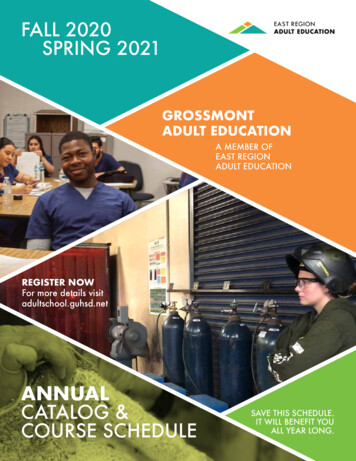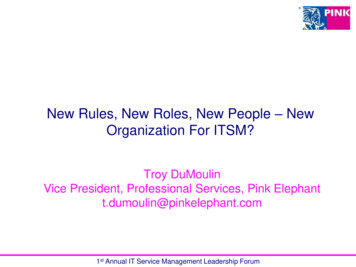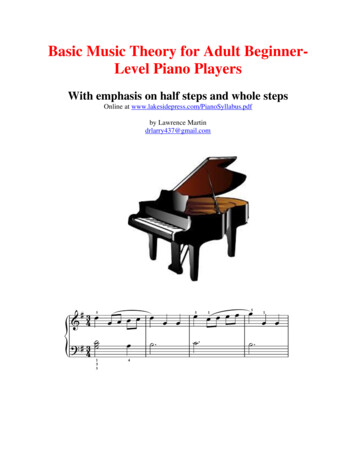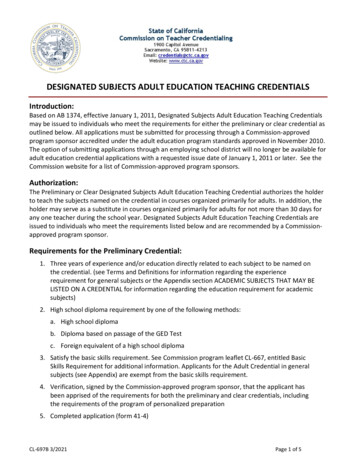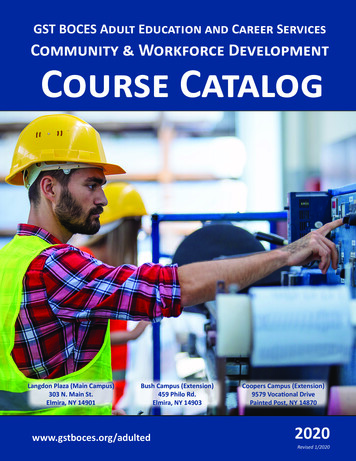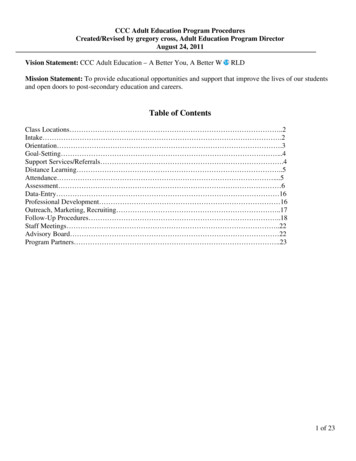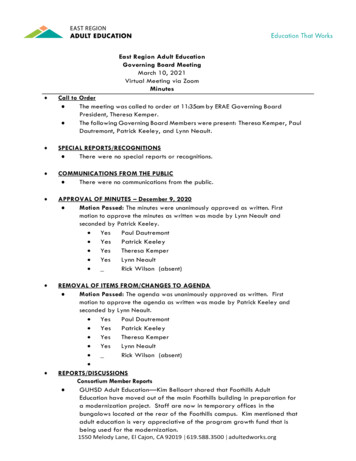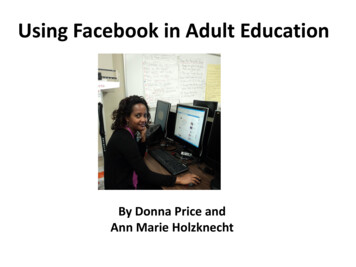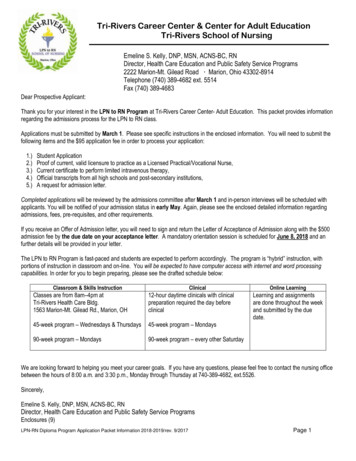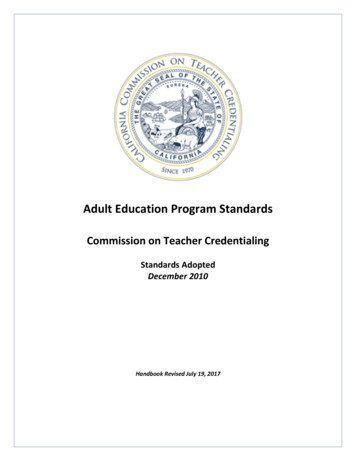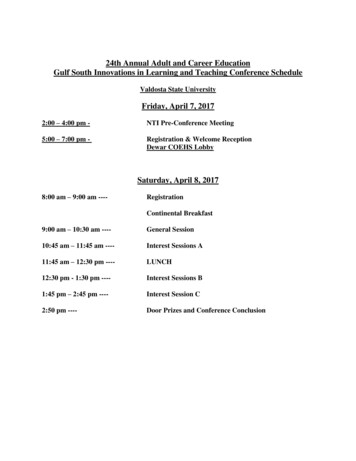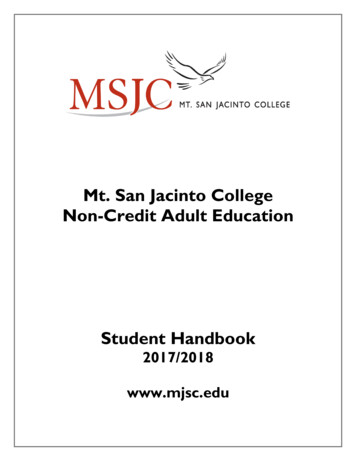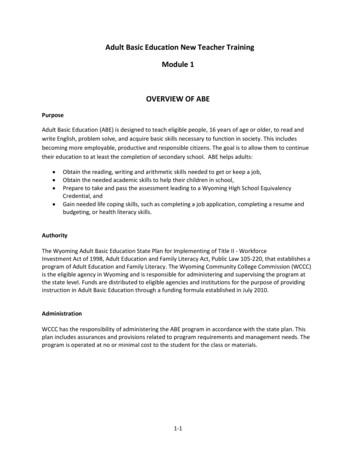
Transcription
Adult Basic Education New Teacher TrainingModule 1OVERVIEW OF ABEPurposeAdult Basic Education (ABE) is designed to teach eligible people, 16 years of age or older, to read andwrite English, problem solve, and acquire basic skills necessary to function in society. This includesbecoming more employable, productive and responsible citizens. The goal is to allow them to continuetheir education to at least the completion of secondary school. ABE helps adults: Obtain the reading, writing and arithmetic skills needed to get or keep a job,Obtain the needed academic skills to help their children in school,Prepare to take and pass the assessment leading to a Wyoming High School EquivalencyCredential, andGain needed life coping skills, such as completing a job application, completing a resume andbudgeting, or health literacy skills.AuthorityThe Wyoming Adult Basic Education State Plan for Implementing of Title II - WorkforceInvestment Act of 1998, Adult Education and Family Literacy Act, Public Law 105-220, that establishes aprogram of Adult Education and Family Literacy. The Wyoming Community College Commission (WCCC)is the eligible agency in Wyoming and is responsible for administering and supervising the program atthe state level. Funds are distributed to eligible agencies and institutions for the purpose of providinginstruction in Adult Basic Education through a funding formula established in July 2010.AdministrationWCCC has the responsibility of administering the ABE program in accordance with the state plan. Thisplan includes assurances and provisions related to program requirements and management needs. Theprogram is operated at no or minimal cost to the student for the class or materials.1-1
Enrolling students into the ABE ProgramTransitional counseling,Bridge classes, referrals totraining, apprenticeships, orWorkforce ServicesThese flow charts demonstrate the flow of activities to assist the ABE student to reach their personaland academic goals. Both the initial educational functioning level (EFL) and student goals (long andshort term) are established within the first twelve hours (12 hrs.) of attendance in the ABE program. Theteacher and the student must understand the progression or pathway to reach the goals.Postsecondary Ed. orTraining Activity orWorkAdult Secondary EducationEFL Low 9-10.9 & High 11-12.9Literacy LevelEFL 0 – 1.9Beginning ABEEFL 2- 3.9Intermediate ABEEFL Low 4-5.9 & High 6-8.91-2
ABE Teacher – Typical DutiesINSTRUCTIONEnsure testing of students is complete and recordedStudent folders contain in-take form with student/guardian signature(s)Student folders contain individualized study plans or diagnostic sheetsStudent folders contain documentation of student progressContact is made with each student during classLesson planning is utilized in managed classesIndividual and group instruction is utilizedMATERIALSAll levels/forms of tests are available and used properlyAll levels of materials are available and used properlyTeacher has skill & knowledge in the use of software and equipment used in classroomSTUDENT RECRUITMENT AND RETENTIONAssist in creation of brochures, flyers, etc.Encourage students to bring adult family and friends needing our servicesPossess a positive rapport with studentsConduct and document follow-up activities for retaining students by phone, email, etc.ACCOUNTABILITYAppropriate and clear goal setting and recording of goalsConsistent tracking of attendance with sign-in sheets or time keeping systemsTracking and timely post-testing for educational gainsConduct and document follow-up activities for goals after students exit the programSITE FACILITYMake facility comfortable and conducive to learningEnsure classroom is easy to find and is well-markedHave classroom well-organizedPROFESSIONAL DEVELOPMENTSelf-assessment and plan PD to meet demands – LD, lesson planning, use of technology, learning styles,Understand and apply transition to college and work skillsMaintain/enhance skills & knowledge as demand and regulations requireTake advantage of opportunities for PD in online courses, at conferences, and at Fall Institute1-3
Program Concept:To Increase Student Achievement through Continuous Program andSystem gQualityTeachingCommunities of PracticeCollective LearningSynchronousIndividual LearningAsynchronousSynchronous Face-to-face Google sitesSessions Online discussions, blogs Webinars, Webinars, recordedReal-time Conference call Online courses Learning CommunitiesAsynchronous Coaching Mentoring F-2-F, phoneonline, Tech Assist Courses, F-2-F Research Journaling Email, Tech Assist. Self-paced coursesOnline tutorialsDeveloped by the Beverly Wilson Arizona Department of Education, Adult Education Services and printed with permission.1-4
Types of programs:Adult education programs funded by Title II of the Workforce Investment Act and State appropiations tothe WCCC may contain one or more of these components:Adult Basic Education (ABE)Instruction in language arts and/or mathematics provided to adults who function below 9th grade levelin reading or mathematics, or both.English as a Second Language is considered a specialized type of Adult Basic Education.English as a Second Language (ESL)Instruction in English language communications skills (understanding, speaking, reading, and writing)provided to students whose native language is not English. ESL may also include instruction in citizenshipto prepare for naturalization.Corrections and Other InstitutionsInstruction in language arts and/or mathematics provided to adults who are incarcerated or areinstitutionalized to advance their education and completion of a high school equivalency credential.GED Test PreparationInstruction designed to prepare students to pass the GED test of high school equivalency. GEDexaminations include mathematics, science, social studies, language arts, reading, and writing.Sources of Students: Agency Referrals Social Services – TANF, SNAP, Workforce Services – WIA Title I Vocational Rehabilitation Court Services/ Probation and Parole/ Inmate release General Public Schools Businesses Advertising Word-of-mouth by your studentsTEAMYou are part of local provider’s team and will be required to attend staff meetings.Some programs may require you to job shadow to get hands on training at a site.1-5
The Wyoming Community College Commission (WCCC) is the eligible agency in Wyoming and is responsible for administering and supervising the program at . Conference call Online courses Courses, F-2-F Self-paced courses Learning Communities Online tutorials . Developed by the Beverly Wi
